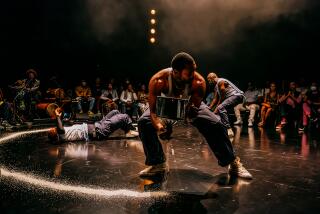MOVIE REVIEW : Beneath the Green of Ireland
- Share via
“Impetuous! Homeric! “ Barry Fitzgerald exclaimed, when he saw the ruined remnants of John Wayne’s and Maureen O’Hara’s nuptial bed in “The Quiet Man.” It’s that type of rough and wry blarney eloquence that infuses much of “The Playboys” (at the Park Theatre). Full of bawdy lyricism and rough-hewn wit, graced with an expert cast, it’s an Irish pastorale set in 1957, a kind of semi-memoir by “My Left Foot” scenarist Shane Connaughton and it revolves around the turbulence stirred up in tiny Redhills by a troupe of traveling players.
In Catholic Ireland, with its love of language, the theater is always an enticement and incitement both, and that’s what Connaughton stirs up here. He’s interested in celebrating Redhills--which was the village of his own youth--and he does. This handsome film charmingly exploits its hills, streams, its bending boughs and the small-town splendor of its village green.
No one in the film is really an author’s surrogate--though Connaughton himself does a bit as a corruptible customs inspector, and there may be a bit of him in the unnamed Redhills boy racing after the departing caravan at the end. For the writer, though, there’s something Homeric and impetuous about Redhills--in the townspeople and, more, in the rebels who flout the conventions, particularly Tara Maguire (Robin Wright).
Tara, who might once have been described as a fiery colleen, is, in the age of Elvis, a firebrand seamstress, proudly bearing her illegitimate child, without naming the father. The scandalized town is rustic but repressed, under the heel of local priest Father Malone (Alan Devlin) and local cop Hegarty (Albert Finney); Tara is its one serious rebel, and it’s she who provides the conflict’s spark. The story has barely begun before Adrian Dunbar (of “Hear My Song”) has killed himself for love of her--and her effect on Hegarty and the Playboys’ male lead Tom (Aidan Quinn) is no less profound.
Connaughton probably intended “The Playboys” as an ensemble piece: He has plenty of potentially rich secondary characters, gabby gossips, undercover IRA types and a whole dizzy pageant among the players themselves. And his theme, with its collision of values between Ireland’s rural past and more cosmopolitan future, is a rich one. But the movie’s focus has been switched from the town to the two lovers, Tara and Tom--and their glowering nemesis, Hegarty--and, once this happens, Albert Finney simply walks off with “The Playboys” entirely.
It’s not that Quinn and Wright give thin performances--they’re a fine and spirited pair--but Tara seems re-conceived from a post-feminist slant: almost too tough, too modern, as if all the sweetness had to be scoured out of her. (Quinn has no such problems, but his role is more a foil.)
It’s Finney who rages against the boundaries of the movie: arrogant, seething, his rages and lusts boiling under a tight, grim surface. When Hegarty rips apart a crib he’s brought for Tara’s baby--which she refuses--there’s something terrifying in his grimness and rigidity. A Dublin exile in a town riddled with smuggling and covert IRA action, he’s a man alone--and it’s no surprise that Connaughton modeled this character, the film’s richest, after his own father.
“The Playboys” needs to have a certain lightness and blitheness to balance the dark brutishness of Hegarty, and the only actor who really hits this key is Milo O’Shea as Freddie, the Playboys’ down-at-the-heels, grinningly optimistic showman. Once he’s set up the premise, Connaughton simply whips us through the shows and fracases--and though his director, Gillies MacKinnon (making his feature debut), has a keen eye for the country, there’s something missing in “The Playboys.”
Poetry perhaps. Even the often denigrated lyricism of Ford’s beautiful “Quiet Man,” whose basic triangular duel is almost duplicated in “The Playboys.” But, painting this picture of a town, and a people, on the brink, Connaughton can perhaps be forgiven for endowing it with a certain never-never quality, for making his heroine tough and true, for remembering as he wants to. “The Playboys” is an admirable addition to the recent wave of revisionist Irish movies (“My Left Foot,” “The Commitments”) and there’s enough madcap grace, humor and lovely provincialism there, to please discerning crowds; some will like it enormously. It’s only, however, when Finney yanks darkness and malice out by the ears, that the movie fully seizes us.
‘The Playboys’
Albert Finney: Hegarty
Aidan Quinn: Tom
Robin Wright: Tara
Milo O’Shea; Freddie
A Samuel Goldwyn Co. release of Green Umbrella Films production. Director Gillies MacKinnon. Producers William P. Cartlidge, Simon Perry. Screenplay by Shane Connaughton, Kerry Crabbe. Cinematographer Jack Conroy. Editor Humphrey Dixon. Costumes Consolata Boyle. Music Jean-Claude Petit. Production design Andy Harris. Art director Arden Gantly. Running time: 1 hour, 46 minutes.
MPAA-rated PG-13.
More to Read
Only good movies
Get the Indie Focus newsletter, Mark Olsen's weekly guide to the world of cinema.
You may occasionally receive promotional content from the Los Angeles Times.










